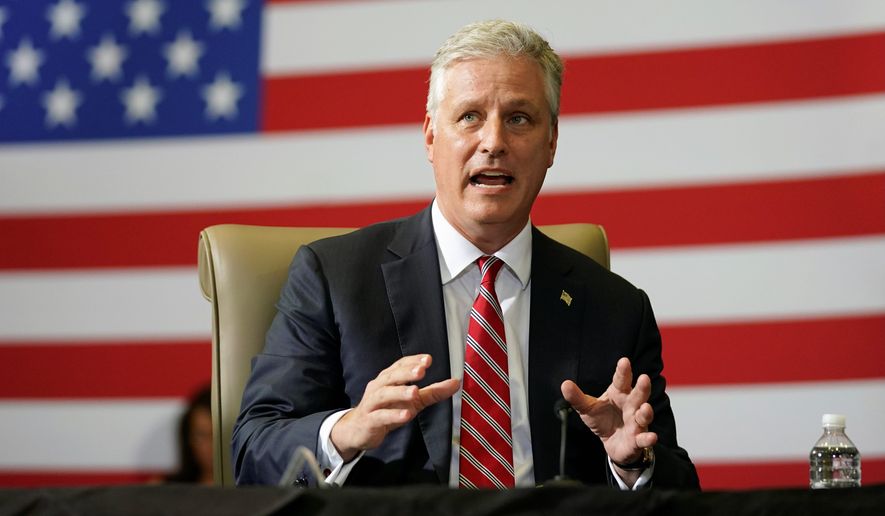Chinese hackers attempted to break into the private email account members of President Trump’s family and also tried to steal emails from campaign and administration officials, said White House National Security Adviser Robert C. O’Brien.
Mr. O’Brien said Microsoft disclosed the hacking attempts. The company posted a report on election hacking by Chinese, Russian and Iranian by cyberactors earlier this month.
The White House adviser told reporters during a recent visit to Iowa that the government has had “tremendous success on the cyberfront” in discouraging and deterring adversary states from interfering in the election. Mr. O’Brien said he could not discuss details of operations on Chinese interference but pointed to a Sept. 10 Microsoft report.
Microsoft, he said, “reported that the Chinese were trying to phish the Gmail accounts of Republican campaign officials, Trump family members, Trump administration officials.”
Phishing is the use of fraudulent emails to entice victims into clicking on links that can permit remote infiltration and control of email accounts.
The Chinese operation appears to have been a copy of the Russian hack-and-release operation during the 2016 presidential election. Moscow hackers successfully stole emails from the Democratic National Committee and Hillary Clinton campaign official John Podesta, releasing the emails just before the election.
Mr. O’Brien said Russian election interference this year include the use of disinformation, troll farms and influence on social media to sway voters.
“There are other things that I won’t talk about publicly,” he said.
An NSC spokesman confirmed the Chinese cybertargeting of the Trump family, the campaign and the administration, but declined to provide further details.
A blog post by Tom Burt, Microsoft corporate vice president for customer security and trust, identified a Chinese hacker group code-named “Zirconium” that tried to gather intelligence on organizations linked to the presidential election.
“We’ve detected thousands of attacks from Zirconium between March 2020 and September 2020 resulting in nearly 150 compromises,” Mr. Burt said, including on focused on breaching email accounts of presidential campaigns and candidates.
Democratic presidential nominee Joseph R. Biden’s campaign was indirectly and unsuccessfully targeted by Chinese hackers through “noncampaign email accounts” of people linked to the campaign.
The Chinese also targeted “at least one prominent individual formerly associated with the Trump administration,” Mr. Burt said.
A Microsoft official said later that noncampaign accounts were either personal email accounts or government or private-sector emails of those targeted.
A second category of Chinese hacks targeted prominent people in the international affairs community, including academics at more than 15 universities and accounts linked to 18 think tanks, including the Atlantic Council and the Stimson Center.
The Chinese methods included “web bugs” or “web beacons” tied to a domain under their control.
The hackers then sent a web link to the controlled account embedded in an email text or as an attachment.
“Although the domain itself may not have malicious content, the web bug allows Zirconium to check if a user attempted to access the site,” Mr. Burt said. “For nation-state actors, this is a simple way to perform reconnaissance on targeted accounts to determine if the account is valid or the user is active.”
During a speech at Iowa’s Drake University last week, Mr. O’Brien expressed concern about foreign adversaries disrupting election infrastructure, where a “foreign adversary would somehow be able to hack into a secretary of state website.” State websites, he noted, are used to tabulating election results.
“Imagine if a foreign adversary got in there and changed the tallies on the website — didn’t actually change the votes. It’s very difficult to change the votes,” he said.
Manipulating those state-by-state tallies could lead to false declaration of the winner and produce major discord in the wronged political camp. The administration has been working with secretaries of state to avoid such voter tally manipulation, Mr. O’Brien said.
“That’s the one thing that would keep me up a little bit at night — a serious, sustained foreign attack on our voting-day electron infrastructure,” he said.
FBI Director Christopher A. Wray told a Senate hearing last week that the country faces multifaceted foreign threats to the elections.
“We are not going to tolerate foreign interference in our elections, and we are working closely with our federal, state, and local partners as well as the private sector to share information, bolster security, and identify and disrupt any threats,” Mr. Wray said.
• Bill Gertz can be reached at bgertz@washingtontimes.com.




Please read our comment policy before commenting.